- Home
- Fern Michaels
To Taste The Wine Page 8
To Taste The Wine Read online
Page 8
It wasn’t until she’d hung the last of Honoria’s gowns that Chelsea noticed the movement of the ship and the creaking of the timbers. Or was it Honoria’s low moans of discomfort? Glancing over at the bunk, she saw her companion lying with eyes fixed on the ceiling. “Honoria, I’m going up on deck. We’re under way, and I want to take a last look at London.”
Honoria nodded, unable to speak. If she unclamped her teeth, she knew she would retch. The last time she had felt so terrible was when she was a young girl with rheumatic fever, the illness that had left her in such a delicate condition. She clamped a hand over her mouth and rolled toward the wall. There was no need for Chelsea to see how ghastly she looked. She envied Chelsea’s vitality. The actress literally bubbled with good health and nothing seemed to bother her. She would probably spend three months at sea without any ill effects, eating and drinking at her own pleasure, completely free of seasickness.
“Dear God,” she prayed aloud after Chelsea had left the cabin, “don’t let this entire voyage be like these past hours.” But she knew her prayers were not destined to be answered. She just knew. Tears gathered in her eyes as she fought to control her queasiness. Why, when she was embarking on a fresh beginning, did life have to be so miserable?
Chelsea followed the glowing lanterns along the companionway to the stairs leading abovedeck. She found a spot to lean against the rail looking out over the stern for her last glimpse of London. It seemed twenty-odd other passengers had had the same idea. The city dockside was glowing with gaslight, magical nimbuses of brightness softened by the evening fog. She could still hear the shouts and calls of the stevedores as they loaded or unloaded cargo. Far up the Thames loomed the towering structure of London Bridge, and behind her she could hear the muted bells of St. Paul’s striking the half hour.
So she was leaving the only home she had ever known, London, one of the oldest cities in the world, traveling to ports unknown, to a raw and exotic land. Would she ever see home again? Ever again hear the chimes of St. Bride’s or smell the delicious aromas from the bakers of White-chapel Street? Suddenly tears sprang to her eyes, and a lump formed in her throat. This had been her city, her place, the shops on Cheapside, the peddlers outside the East India House, the lawns and gardens of St. James Park. She was leaving it, all of it, perhaps for good. A woman’s deep, choking sob tore through the silence. Everyone aboard ship seemed moved and melancholy, all thinking the same thoughts, all experiencing the same sudden homesickness.
“She’s a beauty by starlight,” said a deep voice behind her, so unexpectedly close that when Chelsea turned she found herself pressed against a broad masculine chest.
“Excuse me …” she began apologetically, instantly drawing backward.
“I said, she’s a beauty,” he repeated. “London, I mean.”
“Yes. I was just wondering if I shall ever see her again.”
“If you like it here so well, why are you voyaging to Australia?”
Was she mistaken, or was there a barely disguised challenge in his tone? The lantern shed its light behind him, making it impossible to see his face clearly. She was impressed with his height and the width of his shoulders and somewhat intimidated by his approach. “Why does one travel to New South Wales?” she answered vaguely.
“A number of reasons come to mind. To seek one’s fortune, to begin a new life, to marry, to join family, even to explore the gold fields. Which is your reason?”
Chelsea turned back to the rail, leveling her gaze on the city lights, which were becoming fewer and fewer as they sailed down the Thames. She didn’t care for this man’s impertinence. And he was standing much too close, improperly so. Pressing against the rail and pretending great interest in the scene over the stern, she hoped he wouldn’t realize she hadn’t answered.
“I suppose we can eliminate the gold fields.” He laughed softly. “That proves to be too strenuous for most men and is hardly a fitting occupation for a lady like yourself.”
Chelsea’s annoyance increased. Now he sounded as though he were mocking her.
“Ah, perhaps there is a suitor waiting impatiently for your arrival. Where is your destination once we land in New South Wales?”
“I hardly believe that’s any of your business,” Chelsea answered, trying to keep the annoyance from her voice. “I don’t know you, and I’m not in the habit of speaking with strangers.”
“That tells me something, at least,” he remarked dryly. “This must be your first voyage, else you would already know what a tight little group passengers aboard ship make. Three months at sea hardly leaves room for distance or, in most cases, even proper demeanor. You will find, I’m certain, that acquaintance is made rather quickly here.”
Chelsea’s instincts were aroused. Something about this man alarmed her, made her feel as though he knew far more about her than he revealed. As she turned and peered through the darkness, searching for recognition, they were approached by a ship’s officer, the gold insignia on his dark jacket illuminated by the lantern’s light. He tugged at the visor of his cap and introduced himself. “Nelson Rollins, ship’s purser. Cabin number, please?”
“P-seven,” Chelsea volunteered, grateful for the interruption.
“That’s portside seven,” the purser informed her, checking his log for the name of the cabin’s occupant. “Mrs. Honoria Harris,” he intoned formally, “the captain would be pleased to have you join his table for dinner tomorrow night. Will you accept? Oh, pardon, Mr. Tanner, I see you’ve already made Mrs. Harris’s acquaintance. Mr. Tanner will also be joining the captain tomorrow evening.”
For a moment Chelsea was confused. Then she realized the purser thought she was Honoria. “Who else will be joining the captain?” she asked lightly.
“Mr. Tanner, of course, Mr. and Mrs. Crane, and myself. Captain Winfield would be delighted for your company, Mrs. Harris.”
Chelsea felt deflated. Obviously she wasn’t good enough to be asked to sit at the captain’s table.
“Will you join the captain then, Mrs. Harris?” the purser persisted.
“Where will Miss Myles be sitting?” she asked curiously.
Once again the purser checked his list. “I don’t see any … oh, yes, Miss Myles, your servant. Naturally, Miss Myles will take her supper either in the kitchen, or she will be permitted to carry a tray back to your cabin.”
Even in the darkness Quaid could see the flush that stained Chelsea’s cheeks, making him think of a smoldering fire ready to burst skyward.
“Mrs. Harris? Dinner?”
“Naturally, Mrs. Harris couldn’t refuse the captain,” Quaid assured the purser. “Could you, Mrs. Harris?”
At a loss, Chelsea found she could only shake her head and murmur, “Of course not.” Servant! Maid! Damn that Honoria with all her high-handed delicacy and manners.
“May I walk you to your cabin, Mrs. Harris?” Quaid asked gallantly when the purser had left.
“I’m quite capable of finding my way back alone,” she assured him. “Thank you anyway.”
“No, please. Often the lanterns are unpredictable in the companionways. I insist.” He stepped back, allowing her to pass in front of him. “You really shouldn’t have come on deck alone, Mrs. Harris,” he told her as they strolled toward the stern and the hatch leading below. “It’s quite dangerous. I advise you to come above in the company of your maid; it’s much safer.”
Chelsea stopped in her tracks. “Are you suggesting I be concerned about the integrity of crew aboard this ship or the passengers, Mr. Tanner, or are you warning me of some other danger?” Her eyes flinted sparks of indignation. How dare this man treat her so familiarly? Twice she’d had to shrug her elbow out of his grip.
“Neither the passengers nor the crew need alarm you.” He laughed, a deep, masculine rumble of amusement. “But the sea is another matter entirely. It’s quite easy to fall overboard, did you know?”
“No, I didn’t,” she replied tartly. The sooner she got to her cabin, the
better; she wanted to be rid of this impertinent pest.
“Yes, well, it’s true all the same. I insist you keep your maid at your side. What did the purser say her name was?”
“Why is everyone so interested in my maid?” Chelsea demanded.
“Interested?” he queried innocently, but to Chelsea it sounded like a barb. “I’m only interested in your safety. Oh, Mrs. Harris, remember to make arrangements with the galley for her meals. The poor woman does have to eat, and since she is traveling on your ticket at a reduced rate, you must see to the arrangements yourself.”
“Why don’t you let me worry about how my maid is going to eat. Trust me, she won’t starve. Right now she’s indisposed.” Chelsea’s brain was reeling with the force of her angry thoughts. Reduced fare! Traveling on her ticket! That tricky, deceiving Honoria Harris! No wonder she had to sleep on a trundle bed instead of a proper bunk. Even Cosmo wouldn’t have had the nerve to pull a stunt like this.
Chelsea led the way down the hatch, stepping carefully down the stairs that had been installed for the passengers’ convenience. Mr. Tanner followed close on her heels.
“Honoria,” she heard him murmur. “I had an aunt by that name, a dour-faced spinster. Somehow, it doesn’t seem to fit you.”
Chelsea was becoming more rattled by the moment, but she was determined not to let it show. “Actually, Honoria is an old family name, but I prefer to use my mother’s name, Chelsea.”
Quaid’s brows shot upward. “Two unusual names? No doubt another family tradition.”
“No doubt,” Chelsea snapped. “Here is my cabin, Mr. Tannert. Thank you for escorting me.” In the bright light of the companionway, she was able to get a closer look at him. Tall, dark, lean, with a complexion that bespoke long days in the sun. He certainly was handsome, but why did he constantly wear that mocking grin?
“The name is Tanner, not Tannert. Quaid Tanner. Since this is your first voyage, Mrs. Harris, I put myself at your disposal. If I can be of any assistance, I will be happy to oblige.”
“I hardly think that will be necessary,” Chelsea demured sweetly. “Good night, Mr. Tanner.”
Quickly, before he could say anything more, she opened the door and slipped inside, closing the door behind her and leaning against it. Her heart was beating as though she’d just escaped with her life.
Something about Quaid Tanner disturbed her. She hadn’t liked the way he’d kept on speaking about her maid and calling her Mrs. Harris. And there’d been a light in his eyes, a merriment, that had made her feel as though he knew the answer to some great riddle or was party to a joke. Why, oh, why had she allowed the pretense to continue? Behind her, startling her so that she almost jumped out of her skin, came a sharp rap.
“Mrs. Harris,” Quaid called through the door. “I thought you’d like to know that we’re neighbors, so to speak. My cabin is just across the companionway, portside eight.”
Chelsea’s jaw dropped, and the most she could manage was a tart, “Good night, Mr. Tanner!” She listened to the soft thud of his door as it closed.
Only one gimbaled lantern glowed softly, and in the dimness Chelsea was aware of Honoria’s movements. She turned in time to see the other woman hang her head over a slop pail and retch with painful, dry heaves. At the moment, Chelsea was hard-pressed to keep from adding to the woman’s agony. Maid indeed!
For a few brief moments Chelsea gloried in Honoria’s retching. She was paying for her deceit right now. The question was, when would she, Chelsea, be called on to pay for her deceit? She waited determinedly until Honoria had leaned back against her pillow. Better to get all of this out into the open right now.
“I’m sorry, Chelsea,” Honoria murmured before Chelsea could speak. “I did so want to start off this trip feeling fit and hale. I don’t want to spoil it for you.”
“That’s very kind of you, Honoria, but aren’t you a little late with your concern for me? I just found out, by accident, that you signed me on as your servant. For shame, Honoria! How could you do such a thing? I thought we were friends. Just now the purser came up to me, called me Mrs. Harris, and invited me to the captain’s table for dinner. In front of another passenger! I was so dumbfounded that you could play such a trick on me that I was left with nothing to say. Now everyone is going to think I am you and you are me. And I’m not going to be the one to undeceive them. How much did you save by doing this?” Chelsea demanded suddenly.
Honoria waved her hand as if to say it didn’t matter. Well, Chelsea thought, it matters to me! She watched as Honoria leaned over the slop pail a second time. “I don’t know why I did it, really I don’t,” Honoria said weakly. “Something came over me and I just did it. I was wrong and I apologize. Please forgive me.”
“You’ve made a fool of me,” Chelsea said tightly. “I was so nice to you, helping you home that night and then going to your brother-in-law’s house with you, and this is how you repay me. I don’t even have a decent bunk to sleep in! How would you feel if I’d done this to you?”
Honoria groaned. Couldn’t she ever do anything right? All her life she’d bollixed things up. This time she’d really done a job of it. Whatever would she do if Chelsea moved out of the cabin?
“When I asked the purser about what Miss Myles was to do in regard to her meals, he said ‘the maid’ would be permitted to eat in the kitchen or have a tray in the cabin. Ohhh,” Chelsea said, throwing her hands in the air dramatically.
“Take my place,” Honoria suggested suddenly. “Pretend to be me. I’m ill, and I have a feeling I’m going to remain in this condition for the remainder of the trip. It’s the least I can do to make up to you for what I’ve done.”
“Take your place?” Chelsea echoed as though the thought hadn’t occurred to her the moment the purser had called her Mrs. Harris.
“It’s not so unthinkable. No one on board knows either of us. We won’t be hurting anyone. For your part all you’ll have to do is see to it that my meals are brought to the cabin. I think that’s fair, Chelsea.”
“I don’t have the proper clothes to pretend to be you, Honoria. My wardrobe is meager, at best.”
Honoria leaned over the bed again, and this time Chelsea pitied the white-faced, retching woman. When she leaned back against the pillows again, Chelsea could see that she was exhausted and thoroughly drained.
“You can wear my things,” Honoria offered wearily. “I know you’ll take care of them. You can tell me about the dinners and the get-togethers when you return to the cabin. We could even keep a journal to remind us of this trip.”
Chelsea’s conscience pricked her. The woman did look ill, was in fact ill.
The outlook of having to suffer through the night—let alone the next three months—with Honoria’s illness was not a pleasant one, but she was committed now. Chelsea knew she was being selfish in thinking of herself at a time like this, but she was disappointed that her “fresh start” had such a tarnished beginning.
In the end it was Chelsea who, through the night, whispered calm reassurances to Honoria and pressed cool cloths to her brow. When the first light of day finally peeped through the porthole, she was nearly as exhausted as her bunk mate. Her first night aboard the Southern Cross had proved a dismal portent for her grand new future.
Chapter 5
Most of the day had passed before Chelsea was able to struggle from her trundle bed. Honoria had been asleep since sunrise, allowing Chelsea her much-needed rest. As she sat on the trundle, face turned toward her sleeping companion, she contemplated three more months of inconvenience with a sinking heart. Surely there was something that could be done; perhaps a doctor would know. Honoria was certainly not the first victim of seasickness—perhaps one of the ship’s officers would know what should be done.
Rising quietly so as not to disturb Honoria, Chelsea washed quickly and dressed, her stomach rumbling ominously all the while. It was too late for breakfast, but perhaps it was close to lunchtime. Quickly, she brushed her glossy chestnut hair w
ith long strokes, piling the heaviness atop her head and securing it with tortoiseshell combs. Pinching her cheeks and dabbing a bit of powder on her nose, she left the cabin, closing the door softly behind her.
“Yes, Mrs. Harris,” said Nelson Rollins, the purser. “A terrible affliction, terrible. I’ve seen cases of seasickness that have confined strong men to their beds for an entire voyage. Why don’t you come to my office after lunch and I’ll give you some laudanum for your maid. Give it to her when she’s at her worst; it will help her sleep through the rigors. Be careful, however: laudanum can be addictive.”
“I’ll be careful, Mr. Rollins,” Chelsea assured him. “I’ll keep it on my person at all times and administer it to her only when she absolutely needs it.”
Rollins found himself smiling at this lovely, sweetly solicitous young woman who expressed such deep concern for her servant. Captain Winfield was certainly going to enjoy his dinner this night in the company of Mrs. Harris.
When Chelsea stepped into the dining room to help herself to the cold buffet laid out for the passengers, she spied Quaid Tanner deeply involved in conversation with a gentleman. He didn’t appear to notice her, and she was glad for it. Another pall had settled over her bright expectations for this voyage, and it’s name was Quaid Tanner. She didn’t like the man; he was impertinent and forward, and his slightly derisive yet altogether respectful treatment of her the night before still rankled. It was almost as though he realized the little deception in which she’d become involved.

 Safe and Sound
Safe and Sound Santa Cruise
Santa Cruise Deep Harbor
Deep Harbor Truth and Justice
Truth and Justice Far and Away
Far and Away The Christmas Stocking
The Christmas Stocking 18. Cross Roads
18. Cross Roads Texas Sunrise
Texas Sunrise Take Down (The Men of the Sisterhood)
Take Down (The Men of the Sisterhood) Sleigh Bells
Sleigh Bells A Golden Tree
A Golden Tree About Face
About Face To Taste The Wine
To Taste The Wine Texas Rich
Texas Rich 15. Vanishing Act
15. Vanishing Act To Have and to Hold
To Have and to Hold Eyes Only
Eyes Only Fearless
Fearless 5. Sweet Revenge
5. Sweet Revenge A Season to Celebrate
A Season to Celebrate Cut and Run
Cut and Run 8. Hide and Seek
8. Hide and Seek A Snowy Little Christmas
A Snowy Little Christmas Hidden
Hidden Sins of the Flesh
Sins of the Flesh 3. Vendetta
3. Vendetta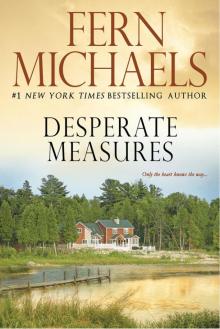 Desperate Measures
Desperate Measures No Way Out
No Way Out Late Edition
Late Edition 11. Collateral Damage
11. Collateral Damage Texas Heat
Texas Heat Forget Me Not
Forget Me Not 4. The Jury
4. The Jury 16. Deadly Deals
16. Deadly Deals Plain Jane
Plain Jane Crown Jewel
Crown Jewel Sweet Vengeance
Sweet Vengeance 19. Deja Vu
19. Deja Vu Point Blank
Point Blank Truth or Dare
Truth or Dare Family Blessings (Cisco Family)
Family Blessings (Cisco Family)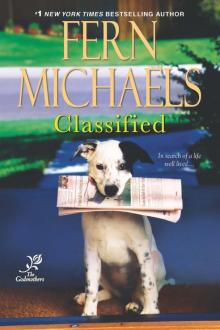 Classified
Classified The Blossom Sisters
The Blossom Sisters Spirited Away
Spirited Away Wishes for Christmas
Wishes for Christmas What You Wish For
What You Wish For Fancy Dancer
Fancy Dancer 14. Razor Sharp
14. Razor Sharp I'll Be Home for Christmas
I'll Be Home for Christmas Vegas Sunrise
Vegas Sunrise Trading Places
Trading Places Charming Lily
Charming Lily Cross Roads
Cross Roads Balancing Act
Balancing Act Cinders to Satin
Cinders to Satin A Family Affair
A Family Affair A Winter Wonderland
A Winter Wonderland 17. Game Over
17. Game Over Hokus Pokus (The Sisterhood: Rules of the Game, Book 2)
Hokus Pokus (The Sisterhood: Rules of the Game, Book 2) Picture Perfect
Picture Perfect Dear Emily
Dear Emily 9. Hokus Pokus
9. Hokus Pokus Cross Roads - Sisterhood book 18
Cross Roads - Sisterhood book 18 Blindsided
Blindsided Fast Track
Fast Track Hey, Good Looking
Hey, Good Looking Kentucky Heat
Kentucky Heat Yesterday
Yesterday Weekend Warriors
Weekend Warriors Coming Home for Christmas
Coming Home for Christmas Vanishing Act
Vanishing Act Gotcha!
Gotcha! Home Free
Home Free Fast Track (The Sisterhood: Rules of the Game, Book 3)
Fast Track (The Sisterhood: Rules of the Game, Book 3) Holly and Ivy
Holly and Ivy Fool Me Once
Fool Me Once The Most Wonderful Time
The Most Wonderful Time Exclusive
Exclusive Jingle All the Way
Jingle All the Way Vendetta
Vendetta Kentucky Rich
Kentucky Rich Lethal Justice
Lethal Justice The Future Scrolls
The Future Scrolls Deja Vu
Deja Vu Getaway
Getaway Mistletoe Magic
Mistletoe Magic Seasons of Her Life
Seasons of Her Life When the Snow Falls
When the Snow Falls Breaking News
Breaking News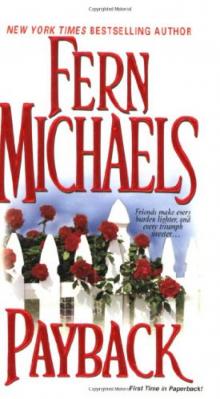 2. Payback
2. Payback Under the Radar
Under the Radar Serendipity
Serendipity High Stakes
High Stakes Need to Know
Need to Know Captive Innocence
Captive Innocence Countdown
Countdown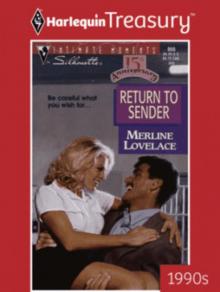 Return to Sender
Return to Sender Fast and Loose
Fast and Loose Sara's Song
Sara's Song Razor Sharp
Razor Sharp 6. Lethal Justice
6. Lethal Justice Hokus Pokus
Hokus Pokus 13. Under the Radar
13. Under the Radar 7. Free Fall
7. Free Fall Collateral Damage
Collateral Damage Whitefire
Whitefire Upside Down
Upside Down Southern Comfort
Southern Comfort Celebration
Celebration 1. Weekend Warriors
1. Weekend Warriors 10. Fast Track
10. Fast Track Making Spirits Bright
Making Spirits Bright Silver Bells
Silver Bells Holiday Magic
Holiday Magic Christmas At Timberwoods
Christmas At Timberwoods Captive Embraces
Captive Embraces Winter Wishes
Winter Wishes Listen To Your Heart
Listen To Your Heart Kentucky Sunrise
Kentucky Sunrise Tuesday's Child
Tuesday's Child Final Justice
Final Justice Free Fall
Free Fall No Safe Secret
No Safe Secret Deadly Deals
Deadly Deals Wish List
Wish List Pretty Woman
Pretty Woman Payback
Payback Mr. And Miss Anonymous
Mr. And Miss Anonymous The Scoop
The Scoop In Plain Sight
In Plain Sight The Nosy Neighbor
The Nosy Neighbor Final Justice: Sisterhood Series #5
Final Justice: Sisterhood Series #5 Sins of Omission
Sins of Omission The Jury
The Jury Captive Secrets
Captive Secrets Hide and Seek (The Sisterhood: Rules of the Game, Book 1)
Hide and Seek (The Sisterhood: Rules of the Game, Book 1) Crash And Burn
Crash And Burn Sweet Revenge
Sweet Revenge Secret Santa
Secret Santa 20. Home Free
20. Home Free Game Over
Game Over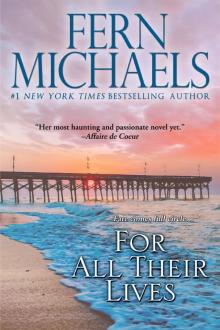 For All Their Lives
For All Their Lives 12. Final Justice
12. Final Justice Hideaway
Hideaway Perfect Match
Perfect Match